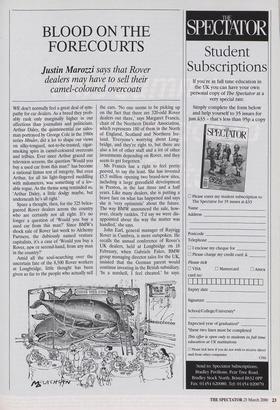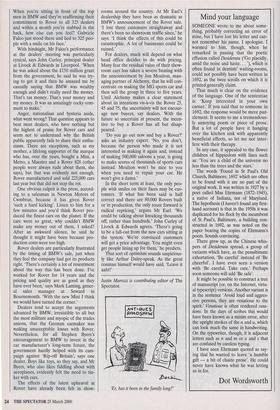BLOOD ON THE FORECOURTS
Justin Maroz,zi says that Rover
dealers may have to sell their camel-coloured overcoats
WE don't normally feel a great deal of sym- pathy for car dealers. As a breed they prob- ably rank only marginally higher in our affections than journalists and politicians. Arthur Daley, the quintessential car sales- man portrayed by George Cole in the 1980s series Minder, did a lot to shape our views on silky-tongued, not-to-be-trusted, cigar- smoking spivs in camel-coloured overcoats and trilbies. Ever since Arthur graced our television screens, the question 'Would you buy a used car from this man?' has become a national litmus test of integrity. But even Arthur, for all his light-fingered meddling with milometers, was something of a lov- able rogue. As the theme song reminded us, 'Arthur Daley, a little dodgy maybe, but underneath he's all right.' Spare a thought, then, for the 325 belea- guered Rover dealers across the country who are certainly not all right. It's no longer a question of 'Would you buy a used car from this man?' Since BMW's shock sale of Rover last week to Alchemy Partners, the dubiously named venture capitalists, it's a case of 'Would you buy a Rover, new or second-hand, from any man in the country?' Amid all the soul-searching over the uncertain fate of the 8,500 Rover workers at Longbridge, little thought has been given so far to the people who actually sell the cars. 'No one seems to be picking up on the fact that there are 320-odd Rover dealers out there,' says Margaret Francis, chair of the Northern Dealer Association, which represents 180 of them in the North of England, Scotland and Northern Ire- land. 'Everyone's worrying about Long- bridge, and they're right to, but there are also a lot of other staff and a lot of other investments depending on Rover, and they seem to get forgotten.'
Ms Francis has a right to feel pretty peeved, to say the least. She has invested £5.5 million opening two brand-new sites, including a large greenfield development in Preston, in the last three and a half years. Like many dealers, she is putting a brave face on what has happened and says she is 'very optimistic' about the future. The way BMW announced the sale, how- ever, clearly ranldes. 'I'd say we were dis- appointed about the way the matter was handled,' she says.
John Earl, general manager of Rayrigg Rover in Cumbria, is more outspoken. He recalls the annual conference of Rover's UK dealers, held at Longbridge on 18 February, when Gabriele Falco, BMW group managing director sales for the UK, insisted that the German parent would continue investing in the British subsidiary. 'In a nutshell, I feel cheated,' he says. When you're sitting in front of the top men in BMW and they're reaffirming their commitment to Rover to all 325 dealers and within a month you're stabbed in the back, how else can you feel? Gabriele Falco just stood there and lied to 325 peo- ple with a smile on his face.'
With hindsight, Mr Falco's performance at the dealers' meeting was particularly cynical, says John Curley, principal dealer at Livock & Edwards in Liverpool. 'When he was asked about the £150 million grant from the government, he said he was try- ing to get it and then he amazed me by casually saying that BMW was wealthy enough and didn't really need the money. That's tax money. That's your money and my money. It was an amazingly cocky com- ment to make,' Anger, nationalism and hysteria aside, what went wrong? That question appears to beat most dealers, who have nothing but the highest of praise for Rover cars and seem not to understand why the British public apparently fails to share their enthu- siasm. There are exceptions, such as my mother, a lifelong supporter of the marque who has, over the years, bought a Mini, a Metro, a Maestro and a Rover 828 (other people were always rude about them, she says), but that was evidently not enough. Rover manufactured and sold 225,000 cars last year but that did not stop the rot.
One obvious culprit is the press, accord- ing to a salesman in Newton Motors of Cwmbran, because it has given Rover 'such a hard kicking'. Listen to him for a few minutes and you'd think Rover pro- duced the finest cars on the planet. If the cars were so great, why couldn't BMW make any money out of them, I asked? After an awkward silence, he said he thought it might have been because pro- duction costs were too high.
Rover dealers are particularly frustrated by the timing of BMW's sale, just when they feel the company had got its products right. 'There's certainly a lot of resentment about the way this has been done. I've worked for Rover for 14 years and the pricing and quality are as good as they have ever been,' says Mark Laming, gener- al sales manager at Seward in Bournemouth. 'With the new Mini I think we would have turned the corner.'
Dealers tend to accept the arguments advanced by BMW, irresistible to all but the most militant and myopic of the trades unions, that the German carmaker was making unacceptable losses with Rover. Nevertheless, for all Stephen Byers's encouragement to BMW to invest in the car manufacturer's long-term future, the government hardly helped with its cam- paign against `Rip-off Britain', says one dealer. Boys like toys, so they say, and Mr Byers, who also likes fiddling about with aeroplanes, evidently felt the need to tin- ker with cars.
The effects of the latest upheaval at Rover have already been felt in show- rooms around the country. At Mr Earl's dealership they have been as dramatic as BMW's announcement of the Rover sale. 'I lost three customers straightaway and there's been no showroom traffic since,' he says. 'I think the effects of this could be catastrophic. A lot of businesses could be ruined.'
For dealers, much will depend on what head office decides to do with pricing. Many fear the residual value of their show- room cars has taken a severe beating with the announcement by Jon Moulton, man- aging partner of Alchemy, that he will con- centrate on making the MG sports car and then sell the group in three to five years. Until Alchemy makes a clear statement about its intentions vis-à-vis the Rover 25, 45 and 75, the uncertainty will not encour- age new buyers, say dealers. With the future so uncertain at present, the incen- tive to buy a Rover has all but disap- peared.
'Do you go out now and buy a Rover?' asks an industry expert. 'No, you don't, because the person who made it is not interested in making it again and, instead of making 500,000 saloons a year, is going to make scores of thousands of sports cars instead. Moulton won't be nice to you when you need to repair your car. He won't give a damn.'
In the short term at least, the only peo- ple with smiles on their faces may be cus- tomers. 'If what has been said is half correct and there are 80,000 Rovers built or in production, the only route forward is radical repricing,' argues Mr Earl. 'We could be talking about knocking thousands off, rather than hundreds.' John Curley of Livock & Edwards agrees. 'There's going to be a fall-out from the new cars sitting in the system. We're convinced customers will get a price advantage. You might even get people lining up for them,' he predicts.
That sort of optimism sounds suspicious- ly like Arthur Daley-speak. As the great conman himself would have said, 'Leave it aaht!'
Justin Marozzi is contributing editor of The Spectator.
'Er, has it been in the family long?'



































































 Previous page
Previous page